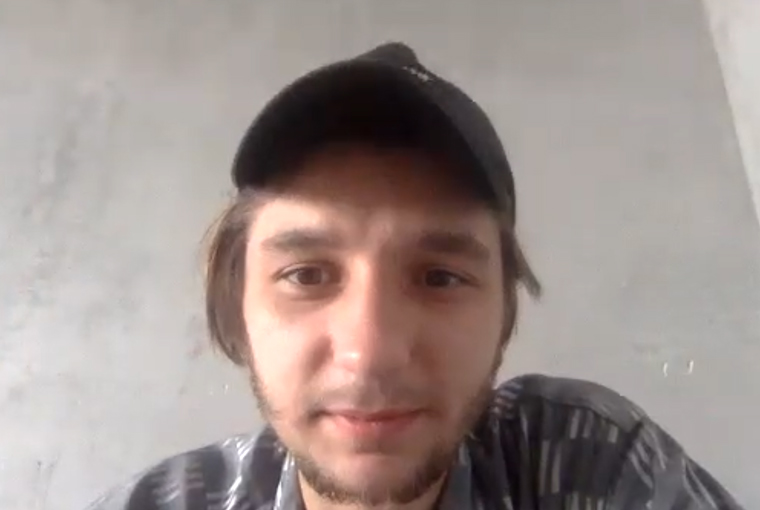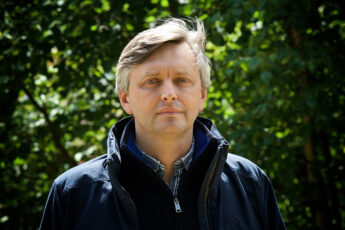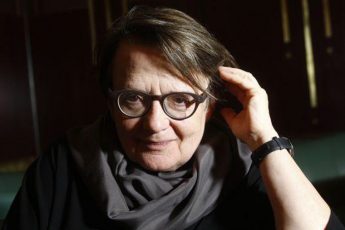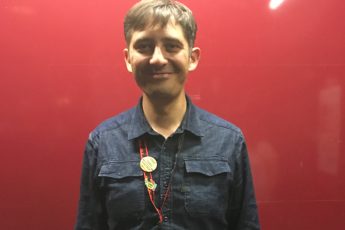
We spoke to Vladimir Nadein, curator and co-founder of the Moscow International Experimental Film Festival (August 19-25). He retold the story behind the creation of the event, spoke about the Russian film scene, and touched on the difficulties of organizing an independent film event.
Is this year’s festival taking place online, or will there also be physical screenings and events?
The festival is taking place physically. I think right now nobody would be interested in an online event. No one is staying at home and cinemas are already pretty packed from what I experienced. There’s another project that I’m curating which takes place online, and there the interest also seems to be decreasing.
To be honest, we didn’t even consider organizing our festival online during the pandemic because experimental cinema is too difficult to enjoy on a laptop. If you’re not quote-on-quote “interested” or familiar with that type of film, you always have the possibility to quit or switch to another tab, whereas in the cinema hall you do not have that possibility. At some point we realized that we will just have to wait for the moment when that is possible again. Luckily, we can do it now, but of course there was a possibility that we would have had to move it to say November or December or even next year.
Of course, the fact that we’re organizing it physically this year means people from abroad cannot attend. But we would really appreciate it if people would consider visiting Moscow and the festival in the upcoming years! People who’ve visited in the past were, I would say, shocked how enjoyable it was.
Is the online project you are curating related to the festival?
No, it’s unrelated, it’s the Russian pavilion at the Venice Biennale, which was in fact cancelled, but the Russian Pavilion decided to go online all the way through November, so I’m curating a Russian film program for that which you can check out on the web. I think people were really interested in the five or six first titles, and now it’s getting less because the attention is obviously not that strong.
Would you say that there were any online events that really worked, or would you describe the past few weeks as a temporary state of dormancy with nothing truly innovative happening?
To be honest, I was mostly living in the forest for the past months and only doing my own online project, so I don’t have a good overview of what happened. Other events that I tried – some film festivals that I really like and that I love to visit every year but which had to go online this year – didn’t work for me, although it’s obviously possible that there were some amazing online projects.
Perhaps there was the opportunity for audiences not normally interested in film festivals to try some niche events out, but we also have the impression that professionals sort of tried to wait it out and just read a book.
Yes, for me it was also reading time. When I watched movies, it was mostly movies I’ve been wanting to watch for the past three years. So again, I wasn’t following online events so much.
What motivated you to create the Moscow International Experimental Film Festival? What’s the story behind its creation?
This year’s the 5th edition so things have grown, but in the beginning, it was just me and a friend who also has a theater background like myself. We were basically driven by our own curiosity and a personal interest in non-narrative cinema. My friend lived in London at the time, where experimental film culture is obviously traceable for years and decades. We would visit underground film screenings and see things that we had never seen before. And so I started to research whether there’s something like that in Moscow but did not discover anything.
Basically, that is how and why we decided to create the Moscow International Experimental Film Festival. In three months time, we had prepared the first edition of the festival, which lasted for three days with around ten film screenings. We did manage to find some Russian artists and engaged a fairly big audience for this type of event. We felt immediately that this is really important for the audience, that there’s a certain sort of hunger for that type of event because artistically and politically Russian cinema is not experiencing the best period in its history I would say – with matters only appearing to get worse in the past five years with censorship and new laws about festival activities. And so we thought we should continue and turn the event into a yearly platform. And now some people who used to be in the audience have become my colleagues and we keep growing, with more people becoming involved every year. Now we’re already thirteen people working on the festival throughout the course of the year.
How connected is Russia’s experimental film community?
I would say that none of the filmmakers who we featured used to consider themselves experimental filmmakers. They were all video artists or visual artists. But there is a history of underground cinema. There was a parallel cinema movement and necrorealism and some of those people are still active and have become our friends, e.g. one of the Aleinikov brothers. There’s a Cine Phantom cinema club in Moscow which started in the late 1980s with a self-published newspaper featuring articles about underground cinema. We also started drawing on that tradition and those activities in our festival. So we did find people who were connected to experimental cinema and video art in various ways, but I wouldn’t say that there’s such a thing as a scene or community in Russia, although we’re trying to help build one. For example, this year we’re featuring a domestic competition of experimental film and video art for the first time, which may not only be a first for the festival, but even for Russia more generally speaking.
We saw that quite a few of the artists selected for the Russian competition are graduates from the Moscow School of New Cinema. Would you say this also fits into what you’re saying about the attempt to build a community of experimental cinema? Would you say you share the same aesthetic ideals and philosophy?
Actually, the narrative of the school is not related to experimental cinema. Perhaps you’ve seen films by Bakur Bakuradze or Dmitry Mamuliya, who’re among the main professors at the school. It’s more related to the Romanian New Wave and referencing those kinds of works. There are some people interested in experimental cinema that are part of the editing department and there’s also a new video art department, so there are certainly people who do and showcase that kind of things, but I wouldn’t say it’s part of the school’s philosophy or main priorities.
You said that you wouldn’t say that there’s such a thing as a Russian scene of experimental cinema, certainly not before you launched your festival. Would you say that there’s still a sort of common aesthetic among the domestic artists who’ve been showcased in your event?
I’ve actually been thinking about that quite a lot. I would be inclined to say that there isn’t anything embracing all aesthetic strands in this sense, it’s still too eclectic. Of course, there are some influences you can detect, say references to old American avantgarde films, but it’s still very random I would say.
Is there a connection to the Russian film tradition among filmmakers who do or are close to experimental cinema?
I would actually say filmmakers are quite deliberately trying to avoid this sort of traditional aesthetic. If you mention big Russian filmmakers, they will tend to try and distance themselves from them. It’s also a question of perspective. In the West, the dominant angle on Russian cinema is very different from how Russian cinema is perceived within Russia, where the focus is much more on trying to bring in a new perspective on that tradition rather than trying to follow in the footsteps of such figures as Tarkovsky. But I would still say that even within Russia, phenomena such as the Russian avantgarde within and outside of cinema is very much neglected, whereas it is not uncommon for artists in the West to be inspired by that era. It’s always strange when you have the impression that parts of your culture are much more widely known abroad.
But reminding audiences of these sorts of tradition is not the main focus of your festival, is it? In other words, isn’t it more about creating a platform for new creative outlet than about educating viewers?
Actually, our festival is very much an educational project, and our means for educating is bringing in other perspectives – Western perspectives, Eastern perspectives etc., but also perspectives from the past. Regarding the past, we’ve featured a retrospective of Parallel Cinema two years ago. We’ve also had a retrospective of Vladimir Kobrin’s work, a 1980s and 1990s avantgarde filmmaker and an early professor of computer graphics at VGIK. We found 35mm prints at his stepdaughter’s country house that were just laying around! People like that have been forgotten and neglected for years, and it is our goal to also remind people of those forgotten figures, to not only show audiences imported stuff, but also unearth that which has been forgotten.
How do you finance such an independent and experimental event?
It obviously changes from year to year, but for the past three years, we’ve had more or less stable finances because the Garage Museum of Contemporary Art funded us, which has made us much more flexible. Still it’s difficult, so we try to draw money from different sources, including cultural institutions, embassies and foundations from around the world. Because of the pandemic and the ensuing crisis, this year was especially tough, but the last two years really did allow us to bring in people from all over the world. Also, the fact that we mainly rely on ourselves makes us much more flexible than big cultural institutions are in crises such as these.
We don’t take money from the Ministry of Culture or any other governmental agency because when you take money from them, they immediately begin to dictate what you’re allowed to show and generally start checking on you. For a festival like ours, that would not be a feasible constellation. Of course, it’s never possible to cooperate with censors, but with us, it’s even more extreme. This year, we’re showing a Barbara Hammer retrospective – can you imagine doing that under the patronage of the Ministry of Culture?
You’ve spent time abroad and are featuring many film happenings from around the world. How cosmopolitan would you say that you as the organizers as well as your audiences are?
As for the team, one of my colleagues, Dmitri Frolov, finished a degree in film studies in London, but other than that we mainly have different backgrounds in culture and the arts. The audience is really, really young, mostly active in culture and the art community, but we’re growing and I’m increasingly getting feedback from people who do not seem to be directly involved in our sphere let alone industry. So I do have the impression that what you could call the “normal” audience is growing.
This year’s situation is quite tricky because the amount of people who’re allowed to attend screenings is not the same as those who’re allowed to party.
Do you think the current situation will constitute a big disruption in the Russian cultural landscape? On the one hand, we’re facing a major crisis, on the other, Russia’s cultural landscape seems to be very much state-dominated, which would theoretically allow for continuity.
It’s difficult to say, because everything just opened and the attention still seems to focus elsewhere – healthcare, the military, travel etc. I have the impression that they just opened cinemas and museums and are saying, “Do your thing”. And I’m only speaking of Moscow, in St. Petersburg for instance cinemas were still closed when they opened here, and in other regions the situation may also be altogether different. I think we’ll see in the end of the year how the cultural landscape will change, or perhaps the beginning of next year. Even though we’re in a different situation as we’re not reliant on government money, it’s difficult to say for us too what the next year will look like. This year we’re still kind of organizing the festival from resources gathered in the past.
Thank You for the interview.




Leave a Comment